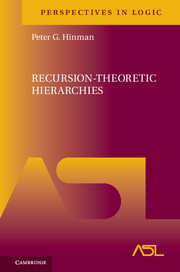Book contents
- Frontmatter
- Dedication
- Preface to the Series
- Author's Preface
- Contents
- Introduction
- Part A Basic Notions of Definability
- Chapter I Groundwork
- Chapter II Ordinary Recursion Theory
- Chapter III Hierarchies and Definability
- Part B The Analytical and Projective Hierarchies
- Part C Generalized Recursion Theories
- Epilogue
- References
- Global Notational Conventions
- Special Notations
- Index
Chapter II - Ordinary Recursion Theory
from Part A - Basic Notions of Definability
Published online by Cambridge University Press: 31 March 2017
- Frontmatter
- Dedication
- Preface to the Series
- Author's Preface
- Contents
- Introduction
- Part A Basic Notions of Definability
- Chapter I Groundwork
- Chapter II Ordinary Recursion Theory
- Chapter III Hierarchies and Definability
- Part B The Analytical and Projective Hierarchies
- Part C Generalized Recursion Theories
- Epilogue
- References
- Global Notational Conventions
- Special Notations
- Index
Summary
The notion of a recursive function resulted from an attempt in the 1930's to provide a precise mathematical characterization of the concept of a mechanically or algorithmically calculable function from into. One way to understand this concept is to imagine an idealized digital computer not subject to error or limitations of memory or storage space. Then a partial function F is mechanically calculable just in case there is a finite program (or algorithm) for this computer which directs it to accept inputs of the form m and carry out a computation with two possible results: if m E Dm F, the computation terminates after finitely many steps with the correct value F(m) as output; if m £ Dm F, the computation does not terminate.
As this is an intuitive concept, however, it cannot be described completely except by convention. Not only is any attempt subject to legitimate disagreement on the basis of current knowledge, but also the possibility remains open that in the future a new means of calculation will be discovered which will be agreed by mathematicians to be mechanical but will not fall under the proposed description. Still, from a practical point of view, the notion seems to be a viable one: most people with a thorough understanding of the concepts involved will agree on the question of whether or not a given method of calculation is mechanical.
In particular, although we cannot give a rigorous proof that every recursive function is mechanically calculable, our justification of this assertion in § 2 below should be convincing to almost everyone. The converse proposition, known as Church's Thesis, that all mechanically calculable functions are recursive, is somewhat more problematic. Without a precise ∧delineation of the class of mechanically calculable functions, we are in no position to prove that all of its members are recursive. We are forced, therefore, to rely on what might be called circumstantial evidence. Most importantly, no one has exhibited a function which is agreed to be mechanically calculable but is not recursive. In a similar vein, every known procedure which produces from calculable functions another calculable function also produces a recursive function from recursive functions.
- Type
- Chapter
- Information
- Recursion-Theoretic Hierarchies , pp. 27 - 68Publisher: Cambridge University PressPrint publication year: 2017

